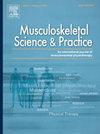肌肉骨骼自我管理问卷的编制与内容效度
IF 2.2
3区 医学
Q1 REHABILITATION
引用次数: 0
摘要
背景:自我管理被推荐用于治疗持续性肌肉骨骼疾病。在自我管理中,应使用标准化和有效的测量方法(例如,调查表)。然而,目前还没有通用的问卷来评估持续性肌肉骨骼疾病患者的自我管理水平。目的编制一份通用问卷,评估持续性肌肉骨骼疾病患者的自我管理水平和自我管理技能。设计测量性质研究的重点是肌肉骨骼自我管理问卷(MSK-SMQ)的开发和内容效度。方法编制MSK-SMQ问卷,共24道题。为了评估MSK-SMQ的内容效度,使用了三个小组(患者、专业人员、研究人员/学者)。对每个问题的相关性、清晰度和重要性进行了评估。此外,还可以提供具体的反馈。采用内容效度指数(Content Validity Index, CVI)测试内容效度(Item-CV [I-CVI])和量表水平(Scale-level-CVI [S-CVI])。CVI是根据相关性和清晰度计算的。用内容效度比(content validity ratio, CVR)来衡量每个条目的重要性。结果/发现91人参加了这项研究。整体内容效度(相关性)极好,S-CVI为0.96。整体清晰度也很好,得分为0.97。相关性I-CVI范围为0.91-1.00,清晰度范围为0.93-1.00。平均CVR值为0.51,范围为0.14 ~ 0.87。结论本问卷的内容效度较好。该研究产生了MSK-SMQ的修订版,可用于未来的研究,以确定进一步的心理测量特性。本文章由计算机程序翻译,如有差异,请以英文原文为准。
Development and content validity of the musculoskeletal self-management questionnaire (MSK-SMQ)
Background
Self-management is recommended for managing persistent musculoskeletal conditions. In self-management, standardized and validated measurements (e.g., questionnaires) should be used. However, there is no general questionnaire to evaluate the level of self-management in people with persistent musculoskeletal conditions.
Objectives
To develop a generic questionnaire to evaluate the level of self-management and self-management skills in people with persistent musculoskeletal conditions.
Design
Measurement properties study focused on the development and content validity of the Musculoskeletal Self-Management Questionnaire (MSK-SMQ).
Methods
The MSK-SMQ was developed, consisting of 24 questions. To assess the content validity of the MSK-SMQ, three panels (patients, professionals, researchers/academics) were used. The relevance, clarity and essentiality of each question was evaluated. Moreover, specific feedback could be provided. The Content Validity Index (CVI) was used to test content validity (Item-CV [I-CVI]) and the Scale-level-CVI [S-CVI]). The CVI was calculated for both relevance and clarity. The essentiality of each item was measured with the content validity ratio (CVR).
Results/findings
91 people participated in this study. The overall content validity (relevance) was excellent, with an S-CVI of 0.96. Overall clarity was also excellent, with a score of 0.97. The range of the I-CVI for relevance was 0.91–1.00 and the range for clarity was 0.93–1.00. The mean CVR value was 0.51 and ranged from 0.14 to 0.87.
Conclusions
The content validity of the questionnaire was found to be excellent. The study resulted in a revised version of the MSK-SMQ, which can be used in future research to determine further psychometric properties.
求助全文
通过发布文献求助,成功后即可免费获取论文全文。
去求助
来源期刊

Musculoskeletal Science and Practice
Health Professions-Physical Therapy, Sports Therapy and Rehabilitation
CiteScore
4.10
自引率
8.70%
发文量
152
审稿时长
48 days
期刊介绍:
Musculoskeletal Science & Practice, international journal of musculoskeletal physiotherapy, is a peer-reviewed international journal (previously Manual Therapy), publishing high quality original research, review and Masterclass articles that contribute to improving the clinical understanding of appropriate care processes for musculoskeletal disorders. The journal publishes articles that influence or add to the body of evidence on diagnostic and therapeutic processes, patient centered care, guidelines for musculoskeletal therapeutics and theoretical models that support developments in assessment, diagnosis, clinical reasoning and interventions.
 求助内容:
求助内容: 应助结果提醒方式:
应助结果提醒方式:


